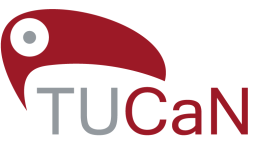Length of theses
The following guidelines apply to theses at the Institute of Linguistics and Literary Studies (all information including spaces, main text + footnotes, without bibliography & appendices):
BA/JBA Thesis: 100,000 characters
LaG; wiss. Hausarbeit: 120,000 characters
MEd Thesis: 140,000 characters
MA Thesis: 190,000 characters
A handout on the registration and preparation of theses is in preparation. Until then, please contact your supervisor and visit the department's website to find out how to register your thesis.
Academic term papers
The term paper is a common type of submission and examination at the university. Term papers underlie certain formal requirements, such as for example concerning the contents and organisation of the title page. A title sheet following the design guidelines of Technische Universität Darmstadt can be downloaded here.
In addition to following the above mentioned formal requirements, students are obliged to add a formal statement to any term paper or other written submissions that any work they submit toward the fulfilment of course requirements is their own work and that none other than the sources cited therein were used in the completion of the task. The text to be used in this formal statement is available for downloadhere (opens in new tab).
Part-time offers
All information about the part-time study plans can be found on the webpage of the Part-Time Studies Office.

Study regulations list the prerequisites for the respective degree program and the necessary academic achievements. Apart from that, the individual modules of a specific course of studies are listed. This allows you, e.g., to check which topics are covered in a course of studies, and whether they are graded. In addition, the study regulations contain information on the possible types of examination (written exam, paper, oral exam, etc.) and in which areas you have to take examinations or present other academic achievements.
Study regulations are available for each course of study, and – due to the fact that each degree program focuses on other topics – the regulations differ from each other. Thus, you can check the respective study regulations to find out, for example, how exactly the Bachelor's course of Digital Philology differs from the Joint Bachelor German Studies or the course of German / Teaching at Secondary Schools.
You might come across different versions of a certain course's study regulations, but from different years. Degree programs are evaluated at certain intervals. As a result, it is possible that they are restructured – leading to changes in the study regulations. If you enroll for a certain degree program, this is usually only possible for the most recent version of the study regulations. If you enrolled on the basis of an older version of the study regulations, you can usually complete the course of studies according to that without having to change anything.
The individual courses of study of the Institute of Linguistics and Literary Studies can be found under Courses of Study.
Examinations are necessary for the successful completion of all types of courses/lectures (lectures, seminars, guided self-study, etc.). As the name implies, examinations serve to check whether a student acquired the respective skills and information of a course of studies – and to award grades. Depending on the type of course/lecture, this can be done in different forms. For example, some examinations will take place in the form of a written exam, others by an oral exam, a written paper, or other variants.
Furthermore, examinations are graded in different ways. In the Study and Examination Plan of the respective course of study, which can be found in the study regulations, you can look up how the individual examinations are graded. Examinations marked Standard are graded, while bnb indicates that an exam can only be passed or failed (without a grade). Further, this plan indicates which exam is an academic achievement (Studienleistung) and which is a subject examination (Fachprüfung).
What is the difference between academic achievements (Studienleistung) and subject examinations (Fachprüfung)?
Most commonly, you will come across academic achievements (Studienleistung) – which are often graded and, thus, add to your final grade, but can also be of the type “bnb” (passed / not passed). The most important thing about academic achievements, however, is that they can be repeated indefinitely. This does not mean that you can try as often as you like, until you are satisfied with the grade – but that you can try again in the case of a failed attempt. If you fail to complete an academic achievement, you can try again until you are successful.
A subject exam, however, is always graded. It usually also counts towards the final grade and is not just assessed as passed or failed. However, the most important difference to academic achievement is the aspect of being able to repeat an exam: usually, subject examinations can only be repeated twice, meaning that you have a total number of three attempts to pass a subject exam. If you fail in the third attempt, you will not be able to complete the course of studies. This leads to exmatriculation and, in addition, you will be blacklisted for the respective course of studies (within all of Germany).
What are the examination regulations?
The examination regulations (“Prüfungsordnung” or “Allgemeine Prüfungsbestimmungen / APB (opens in new tab)”) govern all the circumstances regarding examinations at Technische Universität Darmstadt. This does not only concern the procedure of an examination, but also, for example, the embedding in the individual modules, responsibilities of the administration, the issuing of documents, and many other topics. It should be noted that the APB apply to the entire Technische Universität Darmstadt – meaning that they are not restricted to a specific subject area or degree program.
As a student of TU Darmstadt, you do not have to know the examination regulations (APB) by heart. It is, however, a good idea to get an overview and to find out where to look for specific aspects. The examination regulations are not only of interest for the university administration and the lecturers, they are contain very important information for the students: How often can I repeat an examination? Until when can I unsubscribe from an exam? Are exams taken abroad recognized here? How are examinations assessed and what period of time is allowed? These and other questions are answered in the examination regulations, which consist of almost 30 pages. Thus, it worthwhile to take a closer look at the APB. If there are any urgent problems or critical cases, you can contact the respective office.
Further important information
Regarding things like VPN, your Athene Card or your student E-Mail Address, you can find all the information here
Moodle

Moodle is the e-Learning platform used at Technische Universität Darmstadt. On Moodle, teaching materials are made available for individual courses and students can collaboratively work on exercises, communicate with professors and fellow students and submit course work.
TUCaN

The online platform TUCaN is the Campus Management System of Technische Universität Darmstadt. On TUCaN, all relevant processes such as enrollment for courses and exams as well as exam and grade management are documented and accessible at any time.


